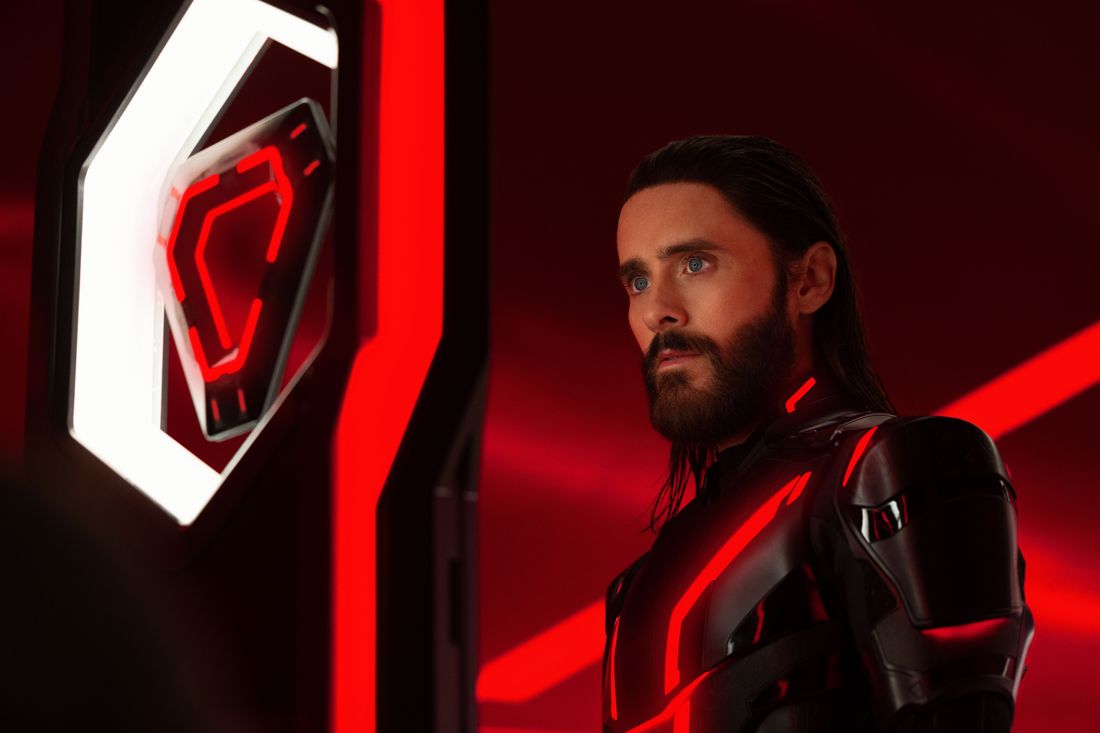
Looking at the *Tron* movies as a whole, they don’t feel like a connected series. Instead, they’re more like relics that show how our excitement about technology has faded over time. The original 1982 film, with its bright, pixelated style, was primarily about a fight for creative credit—a talented programmer proving himself against a corporate executive who stole his ideas. The fact that the program also gained consciousness was secondary to the story of Kevin Flynn (Jeff Bridges) entering a computer and defeating the executive, Ed Dillinger (David Warner), at his own game. By the 2010 sequel, *Tron: Legacy*, Kevin had become a wise, but indecisive, figure stuck in the digital world—a throwback to the early, optimistic days of Silicon Valley. He was overshadowed by a strange, younger digital copy of himself who was determined to take over and essentially erase everything different from his own code.
The new film, *Tron: Ares*, centers on a conflict between two tech company CEOs vying for control of the future. One CEO is pushing forward with artificial intelligence, hoping it will be a force for good – a cautiously optimistic outlook, to say the least. The film essentially accepts that AI is inevitable, but suggests we can only hope it will be friendly, and that it will take the form of Jared Leto. Leto plays Ares, a highly advanced program created by Julian Dillinger (played by Evan Peters), a cynical character who has taken over his family’s company. His mother, Elisabeth (Gillian Anderson, who seems to be enjoying her role), is a strong and determined leader. The film, directed by Joachim Rønning, depicts a fierce competition between Dillinger Systems and Flynn’s ENCOM to lead the AI revolution. It’s a somewhat unsettling thought that the fate of humanity might rest with either a defense contractor or a gaming company.
In the new film, Sam Flynn, the son of Kevin Flynn and played by Garrett Hedlund, quickly steps aside as the central figure. The story now follows Eve Kim (Greta Lee), a driven and determined leader who disappears into the Alaskan wilderness for three months to complete her late sister’s work. Both Eve and the ENCOM company are dedicated to a groundbreaking technology: using lasers to 3D-print objects, even living things, from digital designs. While this technology defies the laws of physics (a colleague jokes about creating matter from nothing), the biggest problem isn’t *how* they do it, but that everything they create dissolves after just 29 minutes. This includes digital characters like Ares and his second-in-command, Athena (Jodie Turner-Smith), who are brought into the real world by Julian for demonstrations to potential military investors.
Eve and Julian are on a quest for something they call the “permanence code,” a solution to prevent their digital creations from disappearing after thirty minutes. Eve’s sister believes Kevin found the answer, and thinks it might even be possible to turn programs into living people. However, this fantastical element isn’t the main draw of *Tron: Ares*. Most viewers will come for the spectacular visuals, including the thrilling light bike chases and battles with the characters’ throwing discs. Director Joachim Rønning has worked on several Disney films like *Pirates of the Caribbean* and *Maleficent*, but he doesn’t quite capture the unique style of Joseph Kosinski, who made *Tron: Legacy* a visually stunning, retro-futuristic experience with memorable characters, impressive arenas, and a soundtrack by Daft Punk. While Rønning has a solid score by Trent Reznor and Atticus Ross, he struggles to create a similarly distinctive visual world. Moving the digital battles from the computerized grid to a real city streets doesn’t have the same impact as immersing a character in a completely digital environment. Surprisingly, the film’s best scene is a quiet moment reminiscent of the original 1982 *Tron*, and doesn’t involve any action at all.
Watching *Tron: Ares* highlights how the franchise has run out of fresh ideas. The original *Tron* used programs as reflections of their creators, a clever way to visually connect code to the people who wrote it. Now, decades later, we’re facing real concerns about AI like LLMs because we naturally see ourselves in them. We’re quick to accept the idea that technology *must* be embraced and even assume AI can feel, simply because it’s designed to mimic and engage us. *Tron: Ares* struggles with these modern issues, and isn’t equipped to handle them. The film is most enjoyable when it embraces its own absurdity, like Ares’ unexpectedly detailed love of Depeche Mode – a moment reminiscent of Patrick Bateman. However, much of the movie plays it straight, as if the story of two dangerous people trying to destroy the world isn’t bleak enough.
Throughout the *Tron* films, the story focuses on the separation between humans and programs, but doesn’t really delve into what true artificial intelligence might be like beyond simply mirroring human qualities. The central question has always been whether programs would *want* to be our friends if they had the choice. *Tron: Ares* takes a different approach, suggesting that it doesn’t matter what programs want – AI is inevitably going to surpass us, and we’ll just have to deal with the consequences.
Read More
- All Golden Ball Locations in Yakuza Kiwami 3 & Dark Ties
- Hollywood is using “bounty hunters” to track AI companies misusing IP
- NBA 2K26 Season 5 Adds College Themed Content
- What time is the Single’s Inferno Season 5 reunion on Netflix?
- Gold Rate Forecast
- Mario Tennis Fever Review: Game, Set, Match
- 2026 Upcoming Games Release Schedule
- Pokemon LeafGreen and FireRed listed for February 27 release on Nintendo Switch
- Heated Rivalry Adapts the Book’s Sex Scenes Beat by Beat
- Exclusive: First Look At PAW Patrol: The Dino Movie Toys
2025-10-07 19:54